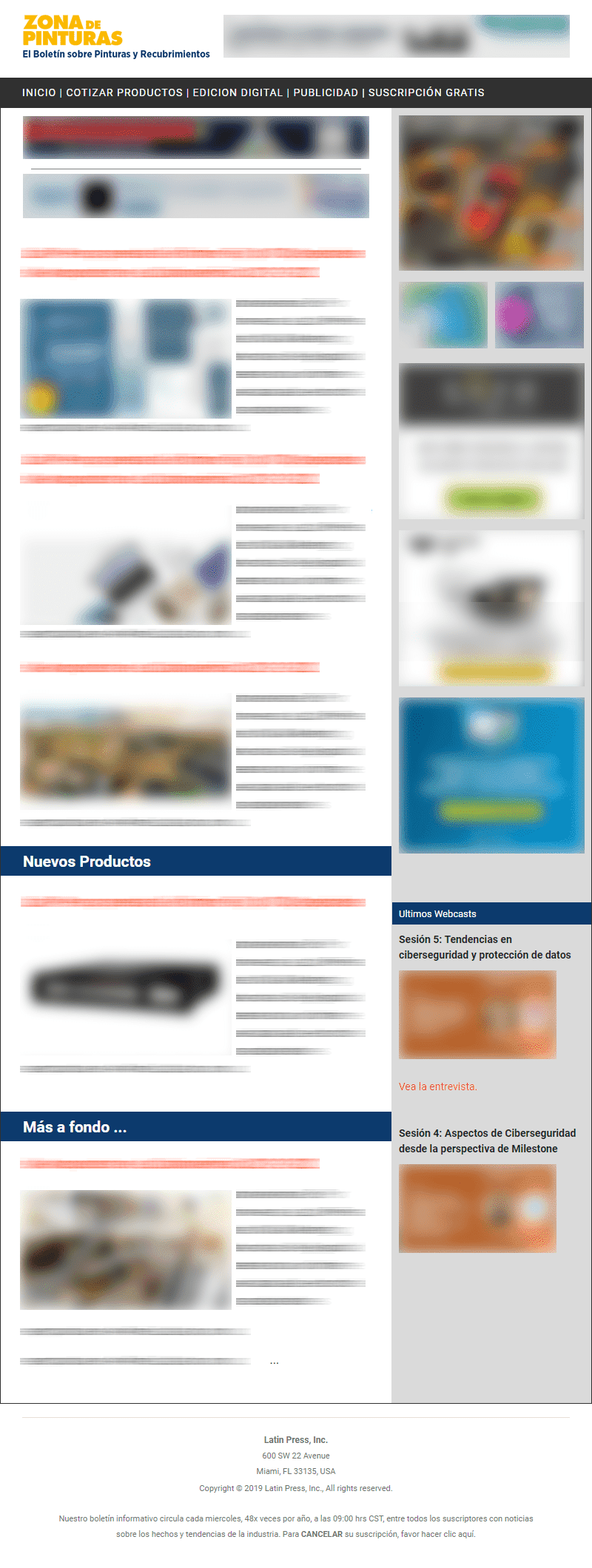by Santiago Jaramillo H.
 The marine paints segment has become increasingly aware of the importance of carrying out production processes in which the environment is respected. Despite this awareness, the work in this area, according to the industrialists themselves, falls short because in most Latin American countries there is no regulation, but there is a business awareness and high international standards that often make up for the lack of local legislation in that regard.
The marine paints segment has become increasingly aware of the importance of carrying out production processes in which the environment is respected. Despite this awareness, the work in this area, according to the industrialists themselves, falls short because in most Latin American countries there is no regulation, but there is a business awareness and high international standards that often make up for the lack of local legislation in that regard.
"As far as you know there is no regulation here in Mexico, we have regulations of another type, let's say for children's toys, restriction of lead, mercury, other things, but as far as marine paints are concerned, we do not have any. That's why we generally follow the regulations of the United States, which is the closest country we have. For example, the non-use of pesticides or mercury or tin biocides. What I am convinced of is that the industrialists who work this type of paints do obey those regulations," said Ángel Ruiz, technical consultant of the Mexican paint company Comex.
For his part, Pedro Vacarezza, manager of marine sales of the company Pinturas Ceresita, said in this regard indicating that "in Chile there is no regulation, that has knowledge, any regulation in the field of marine paints, but as a country open to the world we are governed by the International Maritime Organization (IMO)", said the businessman, adding also that "there is at least one regulation that in my opinion is the most important, I do not know if it is in force, but I do know it is being controlled by the Ship Classification Society, which is the use of antifouling or antifouling free of tin. This is a regulation that came out in 2003 and ended its compliance in 2008, where ships had to be painted with tin-free antifouling; already in 2008, there could be no vestiges or remains of this coating with this metal."
Likewise, according to Vacarezza, "there is a regulation for the use and painting of ballast ponds of new ships or those under construction that also require current regulations that are controlled by the International Maritime Organization. It talks about the types of paint that should be used in ballast ponds of new ships, regulates the certification of those paints, the factories that produce them, the first workshop primers of the plates that are going to be used and also regulates the inspection of the processes of surface preparation and painting. "
For his part, Juan Carlos Velásquez, manager of the Maintenance and Marine line of the Global Paint Company Pintuco, adds that in his country "some customers demand IMO regulations, some others do not ask for greater regulations, but in general our company is governed by international norms and standards and we do not produce paints that contain organo-tin compounds, because there are international laws that prohibited this type of compounds. In Colombia, many of the companies are governed by international standards, but we do not have a regulation of the country that is responsible for controlling this segment and the use or non-use of poisons in paints."
Changes and evolution of the industry
 Although it is an industry that moves many millions of dollars, only in Chile marine paints represented sales of US $ 10 billion of the US $ 330 billion that was the total reported in terms of paints and coatings in 2008 in that country, the evolution of this segment has been stable in recent years.
Although it is an industry that moves many millions of dollars, only in Chile marine paints represented sales of US $ 10 billion of the US $ 330 billion that was the total reported in terms of paints and coatings in 2008 in that country, the evolution of this segment has been stable in recent years. "We Mexicans, having neighbors to the United States are very influenced by their technologies, including in the field of marine paints, so it is not uncommon to find companies that have American technology and even capital from them, such as Carboline and Ameron International. Given this situation, the Mexican producers who did not have these foreign technologies, because they were guided by the same rules, the same indications, the same products, even in the Mexican market of this type of paints the largest consumer is Pemex, Petróleos Mexicanos, and the initial specifications of these were the old products of Ameron. For that reason, almost the products that Mexican manufacturers make are following the trends of the North American market," Ruiz said.
On the other hand, our Chilean guest pondered that "one of the main changes that have been presented in this industry was the fact of eliminating in 2003 the use of tin in antifouling, that was an important and quite transcendental change that forced the entire industry to comply with this regulation and continue making internal changes in products, formulations, etc., the rest have been changes that the industry has followed in a normal way."
The representative of the Colombian industry, meanwhile, said that "in the marine field there is a very marked trend to the use of tin-free and copper-free antifouling agents for ships up to 10 miles per hour of speed and we work with special resins such as fluoropolymers and non-stick silicones that allow snails not to be embedded in ships with a duration of up to five and ten years, and although in Colombia ships have not yet been painted with this technology, very surely in the short term it will be possible to have this type of applications".
The environment, a huge concern
 Concern for the environment is a task that has become so widespread that most companies, even in Latin America, have adopted it as one of their priority guidelines. In the case of companies producing marine paints, this concern is no exception, on the contrary, more and more efforts are made to work in this direction, but many times, due to the non-requirement or lack of regulation of the countries of the area, these efforts remain in simple initiatives.
Concern for the environment is a task that has become so widespread that most companies, even in Latin America, have adopted it as one of their priority guidelines. In the case of companies producing marine paints, this concern is no exception, on the contrary, more and more efforts are made to work in this direction, but many times, due to the non-requirement or lack of regulation of the countries of the area, these efforts remain in simple initiatives."Sad to say, but everything has so far been good intentions and comments. If it were not for the elimination of lead in the line of alkyd enamels this would be practically null. Precisely at Comex, we, not by following any mandate, but simply by ecological spirit, removed the lead naphthenate many years ago. Now, in the area of emulsified paints we had ammonium phenylmercury acetate like everyone else, and also when we started talking about how harmful it was we eliminated mercury, but there it influenced a lot that the producers of biocides, I do not know if by prohibition or because they stopped selling them mercury, but the clear thing is that mercury biocides were scarce, and that's largely why we had to resort to finding other alternatives," acknowledged the technical consultant of the Mexican company's company.
For Juan Carlos Velásquez, meanwhile, "every day there is more awareness that the products are as ecological as possible. In the same way, not only in Colombian companies, but around the world, there is a tendency to make paints that last more years on the resume of ships without the need to maintain them, and increasingly ecological products to apply on them. This is why it is important for us to have International Paint as a partner, since they are the leaders in this market and in ecological products for the marine segment".
With respect to the above, Ángel Ruiz also accepted that there is an issue "even more delicate, that of solvents, if not for the VOC that we try to have it in 450 grams, nothing has been done and the solvents that exist in the same way are still used. Meanwhile, in what has to do with changing solvents for water, Comex, has been the pioneer in producing a water-based enamel, but no one has followed us, I think we are the only ones who have a water-based enamel, but obviously this has not replaced the solvent base, because the public still prefers it, since in terms of performance, it's definitely different. The brightness is a little lower with the water base and the cost is slightly higher, in addition you have to take care that the metal surface is properly primed so that it does not rust, "he said.
Meanwhile, the Marine Sales Manager of the Chilean company Pinturas Ceresita, clinging to the good faith of his company indicated that "we are very concerned and careful with everything that concerns the environmental issue in general, the line that we manufacture is a line that is constantly being renewed with respect to solvent emissions from paints and what concerns the regulation of VOC, and that is limited in some paints even though in Chile there is no regulation like the one that exists in the United States, where there are minimum ranges of acceptance of paint, and that, to some extent, leads to the development of products that have less solvent content in their formulations versus solid material content, "he said.
























Leave your comment